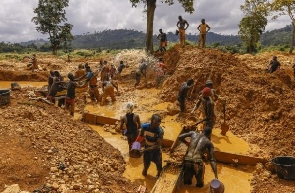 The chiefs want government to introduce a reclamation bond
The chiefs want government to introduce a reclamation bond
Some traditional leaders in the Asante-Akim Central Municipality and Amansie West District of Ashanti are advocating for government to introduce a reclamation bond in the small-scale mining sector.
This, they believed, was the way to go to restore degraded mine sites, lost nutrients and minerals in soils, to effectively deal with the destruction of lands.
They said it was imperative to replicate the reclamation bond system being operated by large-scale mining companies in the small-scale sector with the active involvement of chiefs to ensure sanity in the reclamation process.
They raised the concerns at separate meetings at Manso-Nkwanta and Konongo during a district multi-stakeholder dialogue on mining organized by Tropenbos Ghana as part of its “Securing Food and Ecosystem Services in Mining-Plagued Regions of Ghana” project.
The four-year (2018-2022) project is funded by the Norwegian Agency for Development Cooperation (Norad).
It is being implemented in Asante-Akim Central, Amansie West District, and Akuapim South in the Eastern Region.
The project seeks to through research, engagements, and policy discussions, be able to come out with a harmonized integrated land use within the mining communities in Ghana.
The programme brought together traditional leaders, miners, farmers, district assembly representatives, officials from the Environmental Protection Agency (EPA), Minerals Commission, and landowners to discuss laws, roles, challenges, and other pertinent issues in the mining landscape.
It was held under the theme “Sustainable small-Scale Mining for National Development; the Role of District and Community Level Stakeholders.”
The Chiefs advised that mining should be executed responsibly with citizens complying with associated laws to help sanitize the mining system.
Mr. Christopher Anokye, a member of the Project Advisory Committee for Tropenbos and A Rocha Ghana, said although there were adequate mining laws in the country, the government must enforce the laws to address the lapses in mining.
He indicated that small-scale mining was critical to Ghana’s economy and also provided employment to over a million Ghanaians, therefore, there was an urgent need for addressing its appalling state for progress.
Mr. Anokye disclosed that in the year 2018, the amount of gold produced by the small-scale sector was almost equal to that of the large-scale mines.
Mrs. Mercy Owusu Ansah, Director for Tropenbos Ghana, said community members had a critical role to play in sustaining the environment which was why the organization was ensuring local stakeholder participation and inclusiveness in dealing with sustainable mining for national development.
She reminded Ghanaians to be wary of land use and explained that mined sites took longer years in regaining nutrients and reclamation was very expensive.